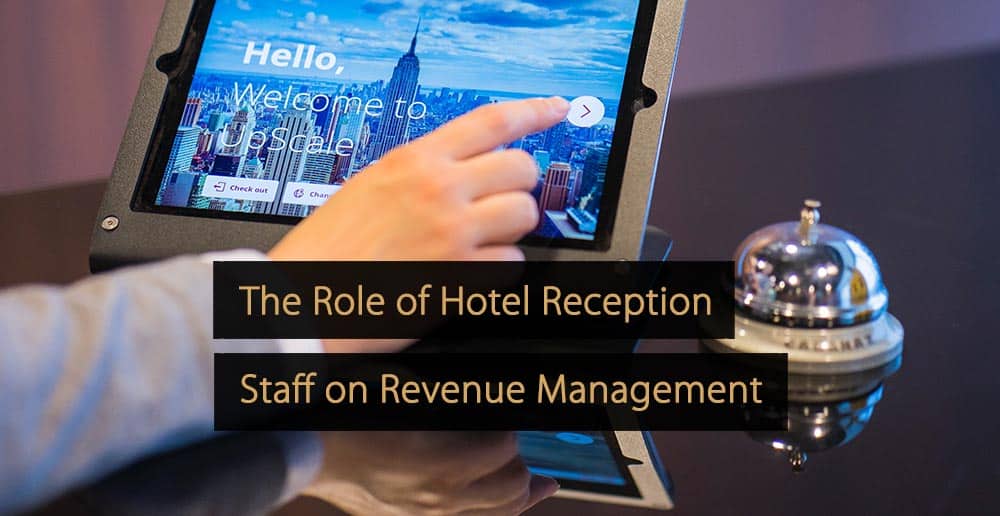Your hotel can do everything right, but if your customers aren’t happy, that can lead to a loss of revenue. Why? Unhappy customers leave negative reviews, and that affects future bookings.
The Importance of a Positive Hotel Reputation
Recently, while browsing some online property reviews, one stood out.
“… we were disappointed by the lack of clarity of the reception that at first had allowed us to keep the room until 16 x then change everything saying that it was booked.”
Ouch. Obviously, there needed to be a better understanding between the guest and reception staff regarding the ability of the guests to have this late checkout. This unhappy guest was left with a negative impression and shared it with the world. A fundamental tenet of revenue management is a positive hotel reputation.
Now, of course, there are times when you can offer early check-ins and late checkouts and times when you can’t. The key is knowing what’s possible and communicating it effectively.
Reception Experience: Two Scenarios
Based on years of reception experience of Revenue Team by Franco Grasso, let’s compare potential scenarios.
1. The Early Check-In
There are two possible variants of the early check-in scenario:
- The customer asks for an early check-in a long time in advance. As always, you take note without guaranteeing anything, saying you will do everything possible, but the customer insists. In that case, you must charge 100% of the previous night, and that’s because blocking the room takes it away from a customer willing to pay the full price of the night.
- The customer asks for an early check-in on the same day, and you already have free rooms.
In that case, you must be very careful who you have in front of you. If the rooms available are very nice and reserved initially for very demanding and high-spending customers, then, in that case, it is better to make the guests who arrived early patient by saying that the rooms are not ready.
However, if standard rooms are available, it is better to offer them to guests without charge. Instead, emphasize the act of hospitality by providing an early check-in for free, which creates the basis for a positive review.
In extreme cases, your staff will face very tired customers (e.g., Americans arriving in Europe after long flights and jet lag.) If the room is not yet ready, but there are courtesy rooms, it is better to accommodate them without charging for early check-in, even if it costs cleaning up the room a second time. You can encourage the customer to leave a positive comment after the stay.
Of course, anytime a room is occupied, remember to block the online and offline sales of the previous night so that the room can remain clean for the early arrival of the customer.
2. Late Check-Out: Courtesy and Conditions
In most cases, if the departing guest is half an hour or an hour late in checking out, that’s usually manageable by the hotel. You can consider it an act of courtesy.
However, if the guest requests a 5 p.m. checkout and 3 p.m. check-in is standard, that’s what we mean by a late checkout, and your hotel reception staff has to use their judgment and consider the ramifications.
Such a late checkout cannot be guaranteed in advance but only on the day of checkout because that’s when you have insight into your room availability.
For a late check-out to occur successfully, at least one of the following conditions must be met:
Your hotel has empty rooms available
As long as there’s availability, reception staff can agree to late checkouts at their discretion.
If the hotel is fully booked, there are a few constraints. When do you expect the next guests to arrive? Does their arrival time leave enough time for housekeeping? Do you have a housekeeping staff who can work out of hours?
If you don’t have the margin or the staff, then there’s no choice but to politely tell the guest it’s impossible to accommodate them.
When do you grant a late check-out but inform the customer they’ll be charged?
- The customer asks for a late check-out, and there are empty rooms, but there is no maid to clean out of the hour. In such a case, it makes sense to charge 100%. This is now a room that’s unavailable to a potential customer. It’s also essential to block the sale of the room online and off because it’s dirty and not resaleable.
- The customer asks for late check-out; there are empty rooms and a maid who can clean up the room (you may be able to resell it.) In that case, it is advisable to charge at least 50% of the night (and block the online and offline sale until the room returns clean) because as you approach midnight, the room is worth less and less (until it reaches the value of 0.)
- The customer asks for a late check-out; there are empty rooms, and you should charge, but the customer had severe problems during the stay attributable to the hotel. In that case, it’s better not to charge anything and offer this opportunity as compensation for a stay gone wrong. An action that, if it does not turn into a positive review, at least reduces the risks of a negative one.
- The customer asks for late check-out long in advance. As always, you note the request without guaranteeing anything but say you will do everything possible. The customer insists, and in that case, you have to charge 100% of the night if you do not have housekeeping attendants out of hours or charge 50% of the night if there is the certainty of having a maid out of hours (but you must permanently block online and offline sales until the room returns clean).
Caveats
Reviewing historical data is always helpful in assessing possible options and forecasting occupancy. For example, if it’s low demand and there’s a good chance some rooms remain empty anyway, you can even consider giving away a free late checkout to get a positive review. This is especially true when you are a new property or must boost your reputation score.
Nowadays, there is software that can help by automating some processes. However, early check-in, like late check-out, is an exceptional situation hotel staff sometimes can’t guarantee in advance, especially in smaller and unique properties. Instead, they must use common sense to determine the best action.
These guidelines can help hotel reception staff interpret early check-in and late check-out requests according to specific circumstances. Of course, each situation is different, so they must use good judgment to prevent wrong choices from turning into negative reviews. Negative hotel reviews represent a decline in brand reputation and, in the long run, a decline in profits. Good judgment and revenue management are intertwined.
Free Ebook: 5 Revenue Management Tips for City, Beach, Mountain & Countryside Hotels
In the ebook “5 Revenue Management Tips for City, Beach, Mountain & Countryside Hotels”, hoteliers find in total 20 practical tips for city, beach, mountain, and countryside hotels to increase their revenue.
Click here to download this free ebook.
More Tips to Grow Your Business
Revfine.com is the leading knowledge platform for the hospitality and travel industry. Professionals use our insights, strategies, and actionable tips to get inspired, optimize revenue, innovate processes, and improve customer experience.Explore expert advice on management, marketing, revenue management, operations, software, and technology in our dedicated Hotel, Hospitality, and Travel & Tourism categories.








Your information about hotel management is excellent; now we are looking to start a hotel in Europe! But let’s see where! Best regards, Ingrid!